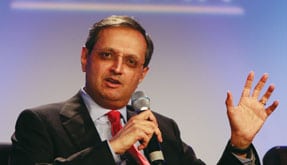Vikram S. Pandit, who took a token salary of $1 during the last two years, making him Wall Street’s lowest paid chief executive, has been rewarded with a $23 million retention package, catapulting him to the highest paid bank executives in the country.
Pandit received $16.5 million in stock and options and a $6.65 million cash payment from the company’s profit-sharing program for top executives.
Richard S. Parsons, Citigroup’s chairman, said in a statement: “Vikram has done an outstanding job since coming on board as the financial crisis began. This award is designed to retain Vikram as our C.E.O. and reward him for future performance benefiting the company and our shareholders.”
H1B Anyone?
The once-coveted H-1B visa program that attracted hundreds of thousands of technology professionals to the United States in the past decade has lost its glitter.
The number of petitions field in April, when the process is opened up for the next fiscal year, has fallen to a sixth of the peak in 2009.
According to the U.S. Citizenship and Immigration Services, the program received just 8,000 H-1B petitions in April, down from 16,500 petitions in April 2010 and 45,000 in April 2009.
The weak economy and increase in H1-B fees to $2,000 from $325 is behind the weak appeal of the visas.
The Sound of Music at MIT
Amar Bose, the 81-year-old founder of Bose Corp., which makes high-end sound systems and headphones, has donated the majority of the company’s stock to MIT, from which he received his bachelor’s, master’s and Ph.D. in electrical engineering and later taught on its faculty.
MIT is receiving non-voting shares, which it cannot sell, and the school will not participate in the management or governance of the company, which employs 9,000 people in Framingham, Mass. Forbes estimates Bose’s net worth at $1 billion.
Falling Out Of Favor
Emerging economies are losing their luster for global fund investors and India is among their least preferred investment destination.
A survey of 188 fund managers in February by Merrill Lynch found that India was the least favored market in the Asia Pacific region, as a result of inflation, rising crude prices and corruption scandals.
Overall, fund managers are overweight on emerging markets at a plus 29%, but are underweight on India at minus 47%, which ranks just above Chile.
